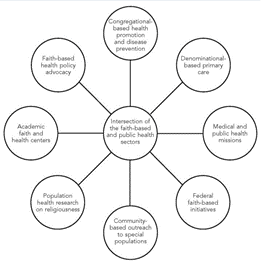The Value of Faith Based Organizations
August 6, 2021Churches, synagogues, mosques, and other faith-based organizations play a critical role in strengthening communities, and the COVID-19 pandemic have further demonstrated the value that they bring to communities. Yet little research exists on the role of faith-based organizations in community development.
Many faith-based organizations provide some form of human services particularly in racialized communities. Specifically, it was these organizations and their volunteers that were providing outreach to community members who were isolated, they provided food and financial support for those in need and was a key source of community resource supports prior to and during the pandemic. Furthermore, during the pandemic faith-based organizations saw tremendous increase in demand for their services especially prior to the availability of public and emergency government funding.
Faith based organizations have demonstrated their value as an important partner in assisting in addressing vaccine hesitancy and serving as vaccination sites as evidenced by the partnership of Ottawa Public Health and faith-based organizations in Ottawa.
The faith-based sector has much potential to offer public health, yet it remains largely underutilized. For this potential to be realized, the public health establishment must set aside any biases about faith-based organizations. Jeff Levin in Faith-based partnerships for population reminds us that “stereotyped portrayals of the faith-based concept and of the motives behind partnerships involving the public health sector do not map onto the longstanding history of collaborative work between religious and public health agencies and institutions. Moreover, without the involvement of the faith-based sector and other institutions of civil society, we will not muster the personal and tangible resources required to fully meet the challenges” faced by health inequities that has been exacerbated by COVID-19.
Faith based organizations are uniquely positioned as trusted agents to have a significant impact and can increase public support for health and other initiatives that addresses the social determinants of health in racialized communities. However, for this to occur faith-based organizations also must address its own failings that impede such partnerships to appropriately address the needs of the underserved and to promote the health and well-being of members of their community.
Faith based organizations are challenged in increasing their community development due to the barriers faced by the minority of faith-based organizations interested in obtaining public funds to sponsor community development. Prior to COVID-19, many racialized faith-based organizations in Ottawa have never applied for government grants. Furthermore, of those that did, the majority was unsuccessful in receiving government grants. This bias must be addressed if equity is a goal for funders.
Faith based organizations can be important levers to create and partner in community engagement, creating programming and supportive infrastructures for racialized and immigrant communities as they have the trust, relationships and is one of the first touch points for new immigrants.
This model of the intersection of faith-based organizations and public health sectors speaks to the idea supportive ecosystem that works together to strengthen communities. Let’s utilizes all the entities that can bring value to communities including faith-based organizations as an important spoke in the equity wheel.


 We are very pleased to have done the “Opportunity Cost of Not Investing in Interpretation” report – it is so important to have clarity on these challenges and…
We are very pleased to have done the “Opportunity Cost of Not Investing in Interpretation” report – it is so important to have clarity on these challenges and…
